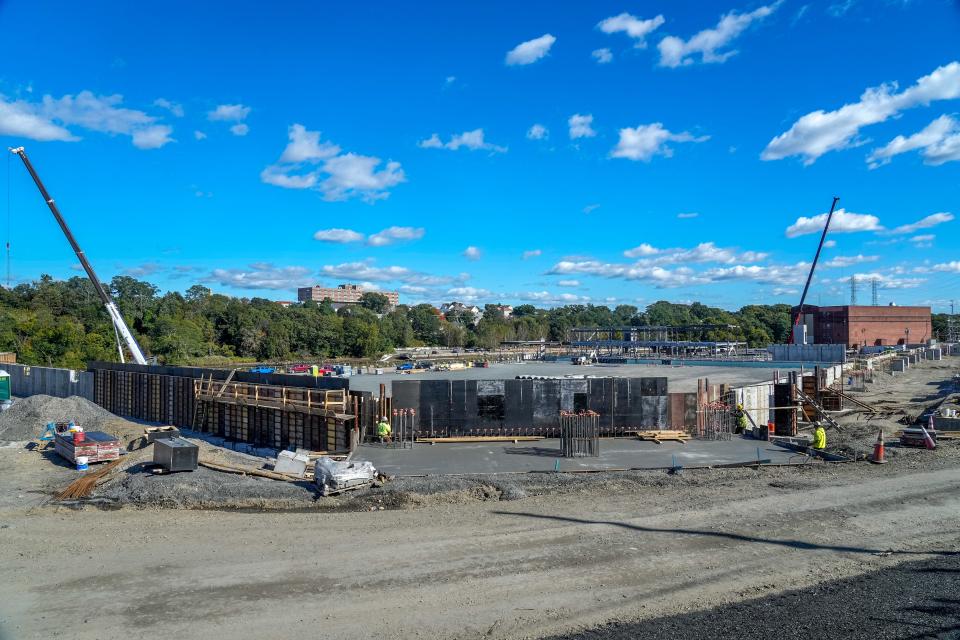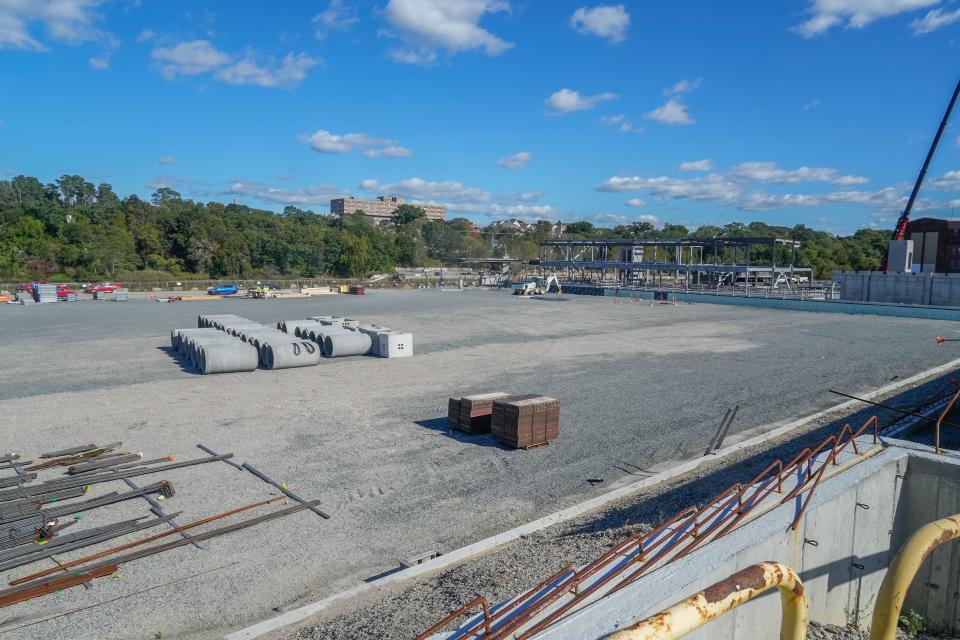Pawtucket's soccer stadium has a new financial backstop the developer is not identifying
An unidentified multi-millionaire has agreed to personally guarantee completion of Pawtucket's under-construction professional soccer stadium.
The new financial backstop for the $137-million stadium known as Tidewater Landing was revealed to members of the Pawtucket City Council on Wednesday, shortly before they unanimously approved a revised agreement with developer Fortuitous Partners.
Is Fortuitous Partners founder Brett Johnson still behind the project?
The previous version of the city's stadium agreement included a personal guarantee from Fortuitous Partners founder Brett Johnson that if something went wrong with the project he would step in to make sure it was finished.
That was before interest rates rose and market conditions surrounding commercial real estate development deteriorated, leading to a roughly year-long delay in construction.

Johnson is still a guarantor, but now an even bigger fish is behind the project in case of emergency, according to city officials.
The stadium-completion guarantee has "been expanded to contemplate a personal guarantee from a guarantor with a significant, personal net worth in excess of $250 million," Jeremy Savage, a lawyer representing the city, told City Council members Wednesday.
"That's a very big change to protect the city," he said. "So what that means is, if I give you a guarantee for the stadium, you aren't getting very much, but if you get a guarantee from someone with that kind of asset valuation, it is meaningful."
New Tidewater Stadium backer's identity 'not ... ever going to be made public'
Who is this mysterious mogul?
"So because it's such a sensitive ... you can imagine a fairly public figure, that's not something that's ever going to be made public," Savage said.
The new guarantor would step up in the event of significant stadium cost overruns or if Fortuitous encounters some sort of financial trouble, although city officials say it is precautionary and not expected to be needed.
"I would say relative to being concerned about the project being completed right now: No, we're kind of full speed ahead," Dylan Zelazo, director of administration for Mayor Donald Grebien, told members of the council's finance and property committees. "This completion guarantee essentially says if we're moving down that pathway and certain things don't come in or certain things come in over budget, that person's standing behind those items."
It was not immediately clear what the new guarantor will receive in exchange for providing a financial backstop to the stadium.
Fortuitous: Mystery backer is member of stadium ownership group
Fortuitous spokesman Mike Raia said Thursday that the guarantor is a member of the stadium ownership group, Tidewater Stadium LLC, who decided to join Johnson in guaranteeing the project to secure private financing.
"Brett Johnson is the sponsor and one of the guarantors of the stadium project and has an active and engaged ownership group that has stepped up to support him in this capacity to deliver this transformative project," Raia wrote. "The ownership group’s support of the project is a clear signal that the private investors are confident Tidewater Landing will be successful. Consistent with our policy as a private enterprise, we are not disclosing the names of private investors."

Savage said another new item in the agreement would allow the city to bring in a management consultant, at the ownership group's expense, if the soccer stadium ran into financial or operational problems somewhere down the road.
The estimated price of the stadium has risen by about $10 million since it was approved last year at $137 million, including financing and soft costs, according to city officials, and those increases will all be borne by Fortuitous and its investors.
Public money at stake in Tidewater's development plans
Last summer, the Gov. Dan McKee-led Rhode Island Commerce Corporation approved a $60-million public financing package that will net Fortuitous $47 million to use to build the stadium. The largest chunk of the package is $27 million in bonds to be repaid with state taxes collected in an area around the project and in central Pawtucket. The city is chipping in another $10 million of its federal pandemic aid and the state has approved $10 million in tax credits.
Where Fortuitous is getting the roughly $90 million remaining needed to build the stadium has remained murky, with Johnson declining to reveal the identity of his investors.
The latest round of stadium documents provided to the city say Fortuitous is taking out $27.47 million in debt through the Commercial Property Assessed Clean Energy (CPACE) program and $17.26 million through the federal EB-5 Immigrant Investor Program.
The Immigrant Investor Program allows foreign nationals and their families to acquire visas and a path to permanent residency in exchange for investment in American development projects. The program has survived several controversies over the years and been used to build a variety of recreational venues including ski resorts, ice rinks and soccer stadiums.
Fortuitous has declined to provide any details about its EB-5 investments, including which country its investors are from. Investments in the program are brokered through middlemen called "regional centers" in the United States and Fortuitous has not said which regional center it is working through.
The CPACE program provides private construction loans for projects with a renewable-energy or energy-efficiency component.
Last spring the CEO of the publicly-funded Rhode Island Infrastructure Bank, which administers the CPACE program in Rhode Island, said Fortuitous had inquired about using the program. Raia on Thursday said the Infrastructure Bank monitors loans made under the program in the state for compliance, but the lending is entirely private.
Fortuitous plan includes housing, retail, restaurants near stadium
After the stadium is finished, Fortuitous wants to build apartments, shops and restaurants next to the venue and on the opposite bank of the Seekonk River. A pedestrian bridge would span the river to connect the two sides of the development.
The latest agreement with Fortuitous approved by the City Council on Wednesday requires the developer to present a "preliminary phase plan" for the post-stadium phase of the project by next June.
This article originally appeared on The Providence Journal: Mystery millionaire is backing completion of Pawtucket soccer stadium

